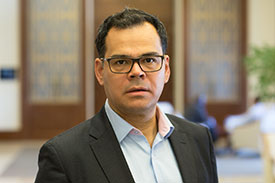World Cup Fans in a World-Class Research Division
Like economics, futbol is its own language. And like much of the world, our St. Louis Fed co-workers plan to catch the 2018 FIFA World Cup, which starts tomorrow in host country Russia. Teams from 32 countries will compete, with the final slated for July 15.
The St. Louis Fed has a world-class Research department, ranking No. 7 in research productivity among all research departments at central banks worldwide. (The division’s director of research is Chris Waller, who’s enthusiastic about the German team but not so much about publicly funded sports stadiums.) The division also has plenty of world-class fans—and at least one world-class player!—so we asked:
- Who are you rooting for in the World Cup, and why?
- Is there anything about the economics of sports that fascinates you?
Responses have been lightly edited.
Juan Sánchez, Research Officer

Who are you rooting for, and why?
Argentina. I was born there, and my parents and siblings live there. The best player in the world now, [Lionel] Messi, is from Argentina. And so was the best player in 1980-90s, [Diego] Maradona, when I was growing up there.
Is there anything about the economics of sports that fascinates you?
I like to think about income differences across soccer players. Should the striker make much more money than the goalkeeper? I also like to think about the valuation of soccer players. Is Neymar really worth $250 million?
Maria Arias, Senior Data Specialist

Who are you rooting for, and why?
Of course, I’m going to be rooting for Costa Rica. I played in high school in the Division I competitive women’s league in Costa Rica and also played for the Costa Rican national team.
There’s a very big soccer culture in Costa Rica, so I started playing soccer when I was young with my cousins. And then I got involved with the club teams. I went to two World Cups with the Costa Rican national team: to New Zealand in 2008 with the women’s under-17 team, and then to the under-20 World Cup in 2010 in Germany. I played as a goalie in both.
It’s hard to find words for the experience of playing at that level. We were the first Costa Rican women’s team to qualify for a World Cup. It was very groundbreaking because we were opening that door for other young girls to follow in our footsteps. Since then, other women’s teams have qualified—not just the younger teams, but also the senior women’s team. It feels like we were opening doors for women’s soccer in Costa Rica, and it was a huge honor.
Right now, I’m just excited to see as many games as I can. I think it’s a great time for soccer. You get to see all the best teams in the world play each other, and all the younger players in the world coming up in their teams, as well.
Is there anything about the economics of sports that fascinates you?
It’s interesting to think about the different career opportunities men and women have with soccer, not only because of the difference in pay, but simply the opportunities to become a professional player. Europe and the U.S. have the most visible professional women’s soccer leagues. Leagues in other regions are starting to grow and, to me, it is exciting to see my former teammates go on to play professionally in leagues all over the world.
Miguel Faria-e-Castro, Economist

Who are you rooting for, and why?
Portugal, country of origin.
Is there anything about the economics of sports that fascinates you?
I like to think about the welfare impact of public spending on sports teams and infrastructure. In a lot of European and South American countries, major sports teams receive large implicit subsidies from the government. Similarly, the public sector is typically responsible for financing large-scale sports infrastructure projects such as stadiums.
This often sounds like a big waste of money, especially because many of these stadiums are not utilized after a country hosts large international competitions. On the other hand, there seems to be large political support for these things. Are societies better off with this type of public spending?
Katrina Stierholz, Vice President, Research Library

Who are you rooting for, and why?
Two teams: I love to watch Mo Salah, and he's playing for Egypt. They haven't been in the World Cup for a long time; it would be good to see them go far. And Iceland. To use a boxing analogy, they are punching way above their weight. They have a very smart approach to youth development. I wish we'd do something like that in the U.S.
Is there anything about the economics of sports that fascinates you?
I'm darkly fascinated by the selection of countries to host the World Cup. And, I am fascinated by the pro/rel [promotion/relegation] format of the leagues in Europe. Teams that don't do well are relegated to the lower professional level; it can have serious financial consequences for the teams. I don't think we'll ever get that in the U.S., but it would make things very interesting.
Andy Spewak, Senior Research Associate

Who are you rooting for, and why?
Admittedly, I’m not all that interested in the World Cup this year without the U.S. being in it, but I’ll be rooting for Iceland, mainly because it’s the home country of Leif Erikson, the namesake for my favorite holiday.*
*Editor’s note: Andy’s a fan of “SpongeBob SquarePants.”
Is there anything about the economics of sports that fascinates you?
I’m interested in whether there exists a relationship between sports success and enrollment at major universities, sometimes referred to as the Flutie Effect.
For example, my freshman year at Mizzou [University of Missouri], our football team went 12-2 and won both the SEC East and the Cotton Bowl; the following fall the university welcomed its largest freshman class ever. Did the exposure and excitement from our breakthrough football season attract more high school seniors to the school? Or was the enrollment boost primarily due to other factors, such as demographics? It’s an intriguing topic to ponder.
Hommy Zhu, Senior Research Associate

Who are you rooting for, and why?
I’ve “watched” soccer games with my dad, half-asleep since the games are usually played at midnight, China time. My partner (and I) will be definitely rooting for Germany. Some reasons include that they were the last champion, always make it to the semifinals, had great soccer reform from 2000 with an excellent echelon construction, have talented players and a talented coach, and a tradition of perseverance.
Is there anything about the economics of sports that fascinates you?
The benefits/harms a country/city faces by being a World Cup host. For example, Korea and Japan did a great job in hosting and reusing stadiums, which accelerated economic growth. Not so much the case for some other countries.
Alex Monge-Naranjo, Research Officer

Who are you rooting for, and why?
I will be rooting for Costa Rica, my country of origin, and the country of origin of my wife and all our families. But the sympathies toward the different teams evolve during the World Cup, based on their performance and form of play. Typically, more offensive/open play teams gain much more support than the more defensive teams. I would love to see some of the underdogs—such as Egypt, Iceland, Morocco, Nigeria, Peru and, of course, Costa Rica—going far.
Is there anything about the economics of sports that fascinates you?
- Production complementarities, i.e. across players.
- Organization capital of countries, reflected on the performance of their national teams, controlling for the quality of players. For example, Germany does not necessarily have better players than Argentina, Brazil, Nigeria or other teams, but they are super efficient relative to them in getting things ready and done.
- Learning-by-playing. The idea is the following: National teams (England, France, Germany) do not play together more than a handful of times a year. This is quite different from professional teams (Chelsea, Paris Saint-Germain, Barcelona, Real Madrid) that play a lot of games during the year. The level of play exhibited by national teams is far inferior relative to that of professional teams. That is why you very rarely see matches across the two teams.
- Many others, but need to be discussed with a beer!
Additional Resources
- Page One Economics: The Economics of Subsidizing Sports Stadiums
- Regional Economist: A Winning Combination? Economic Theory Meets Sports
- St. Louis Fed Research & Data
This blog explains everyday economics and the Fed, while also spotlighting St. Louis Fed people and programs. Views expressed are not necessarily those of the St. Louis Fed or Federal Reserve System.
Email Us



